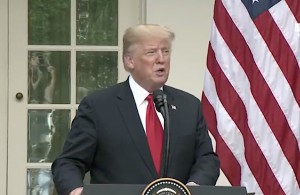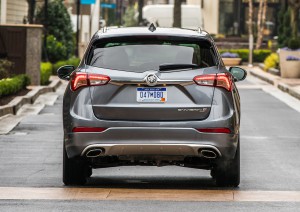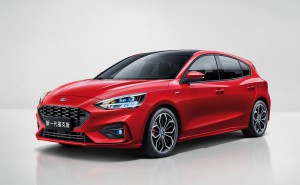
President Donald Trump is engaged in a trade war with China, and automakers are beginning to pay the price.
After nearly two decades of double-digit growth, the Chinese car market is entering a tailspin, and that could be particularly problematic for American automakers caught up in the U.S.-China trade war.
But other foreign automakers could better weather the downturn, in part due to changing rules that have lowered import tariffs – except on American products – and will now allow foreign manufacturers to take control of joint ventures. BMW is set to become the first to take advantage of the relaxed rules, agreeing to spend $4.2 billion to up its stake in an ongoing alliance with Brilliance China Automotive Holdings.
“The automotive industry has been a driver of China’s economic growth for years. Now it is pulling back,” Xu Haidong, the assistant secretary general of the China Association of Automobile Manufacturers, said during a Friday news briefing, responding to questions about the market’s third straight monthly decline.
Chinese new vehicle sales slipped by 11.6% in September. It was the worst dip in nearly seven years and followed a 3.8% tumble in August. Sales were off 4.0% in July. The last monthly sales increase came in June, a modest – by Chinese standards 4.8%. The market hasn’t experienced anywhere near as steep a decline since September 2012 when demand dropped 26.4%, and that was partially blamed on the timing of Chinese New Year, a period when commerce, in general, tumbles.
(Volvo scrambles as Trump tariffs shatter export plans for new U.S. plant. Click Here for the story.)
China remains the world’s biggest automotive market, with sales totaling 20.49 million vehicles for the first three quarters – about 3 million more than the U.S. recorded for all of 2017. But that marked a modest 1.5% increase, one of the weakest gains China has experienced since its car market began to take off at the turn of the millennium. Some analysts are now predicting the first full-year downturn since then, and while CAAM officials continues to predict the market will remain in the black, they concede it will all but certainly fall short of earlier expectations.

The Buick Envision is imported to the U.S. from China. GM hasn't been able to get a tariff waiver from the U.S government.
The slump in the Chinese car market comes at a time when other key business sectors are weakening. Manufacturing is off, on the whole, and the stock market has been weakening, raising concerns that not only the new car market but China’s economy, as a whole, may be feeling the impact of the ongoing U.S. trade war. That said, the country’s trade surplus with the States continued rising last month, hitting a record $34.13 billion, a figure some observers warn could trigger further action by the Trump Administration. For the first three quarters, the surplus stood at $225.79 billion, up from $196.01 during the same period in 2017.
The Chinese auto industry appears to be particularly vulnerable to trade tensions. Increasing tariffs are making it harder for manufacturers there to export products to the U.S., such as the Buick Endeavor. Parent General Motors failed to win an exemption from the increased tariffs imposed by the White House, as has Volvo for its own Chinese-made imports. Ford, meanwhile, last month scrubbed a plan to start importing a new version of its compact Focus line from China because tariffs would make it uncompetitive.
U.S. exports to China have also been impacted. Ford has cut production of its Mustang due to declining Chinese demand, and both BMW and Mercedes-Benz are looking for alternative markets for SUVs produced in the U.S. that were originally intended for shipment to China. Volvo this week told TheDetroitBureau.com it will have to come up with alternative plans for its new plant in Charleston, South Carolina. It originally was expected to export half its capacity, most of that to China.
While there have been reports that Chinese Premier Xi Jinping may meet with Pres. Donald Trump to discuss the trade tensions, it is far from certain they will come up with a fix for the dispute. China could meanwhile take steps to trip up key U.S. companies operating in that market, including General Motors, the country’s second-largest automaker behind Volkswagen AG. In recent years, Chinese consumers have shown a propensity to shift from brands based in countries involved in disputes with their government. That has included Japanese marques, such as Toyota, and Korea’s Hyundai.
(Click Here for more about Trump getting a rebuke from Senate Republicans about tariffs.)
At the same time, China’s leaders have made moves that could help other foreign-owned brands. Auto import tariffs have been raised to 40% on U.S.-made vehicles but reduced to 15% on products imported from Japan, Europe and other countries.
Meanwhile, China authorized a relaxation of rules that required foreign makers to find domestic partners for operations in the country, with those Chinese makers holding at least half of the equity.
On Thursday, BMW announced it would pay Brilliance $4.2 billion to increase its stake in their joint venture to 75% from the current 50% once rules limiting foreign holdings are phased out in 2022.
“We are now embarking on a new era,” said BMW Chief Executive Harald Krueger during a speech in Shenyang, where the operation is based.
(To see more about Ford killing Focus crossover from China due to Trump tariffs, Click Here.)
The question is whether U.S. manufacturers will be left out.

